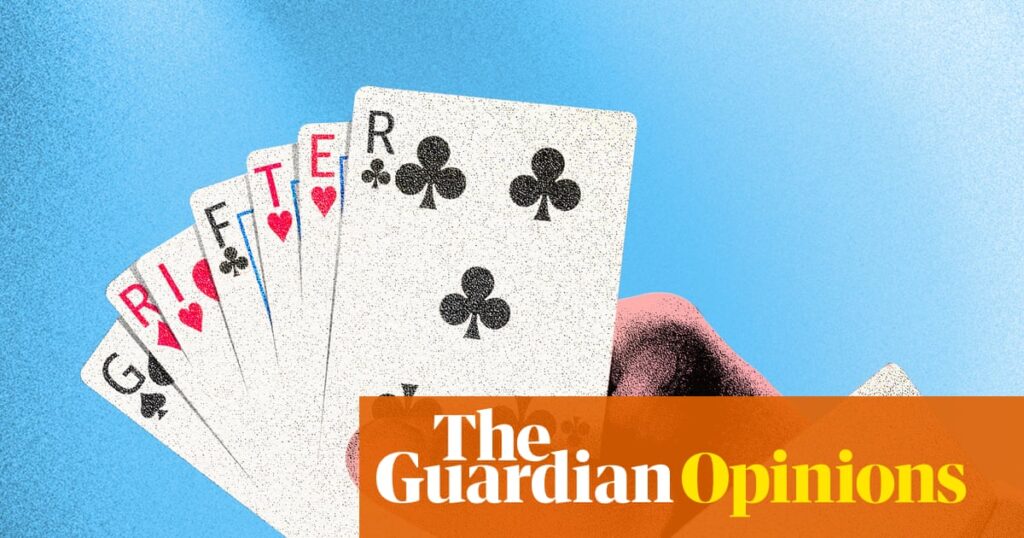Our world is full of grifters. Or so it seems, considering how often that word is thrown around in public life these days.
This year alone, Zarah Sultana, the former Labour MP and founder of a new left party with Jeremy Corbyn, called the Reform UK leader, Nigel Farage, a “billionaire-backed grifter” (perhaps borrowing from the language of Coutts staff who referred to him as a “disingenuous grifter” when his bank account was closed two years ago). Sultana, in turn, was accused of being a “grifter” duping “honest socialists” by the journalist Paul Mason.
When giving evidence at the Covid inquiry, the Spectator editor and former cabinet minister, Michael Gove, called the lawyer Jolyon Maugham, whose Good Law Project campaign group pursued PPE contract cases, a “politically motivated grifter”. Meanwhile, the journalist and author James Ball accused the New York University history professor Ruth Ben-Ghiat of “resistance grift” for suggesting the US health secretary, Robert F Kennedy Jr, is trying to control the population by spreading disease.
In a recent podcast, the Atlantic writer David Frum called Donald Trump’s presidency the “grift machine”, while the US president was also called “grifter-in-chief” by Florida congressman Maxwell Frost. Two years ago, it was the Sussexes who were memorably called “fucking grifters” by Spotify’s head of podcast innovation, Bill Simmons, after their multiyear deal with the platform ended after just 12 episodes.
From 2017-24, the written use of the word “grifter” has more than doubled, according to the Oxford English Dictionary (OED). But over the past few months in particular, it has been striking how often the term – both grifter and grift – is cropping up in our political discourse. In April this year, it made its debut in parliament: it was used in a House of Commons debate on the impact of digital platforms on democracy by the Liberal Democrat MP for Cheltenham, Max Wilkinson. “You find a mad and hateful narrative. You tell everyone it is free speech, and before you know it, you might be lucky enough to become a successful online grifter with your top off,” he said. “Perhaps you will be an MP, or maybe even the president of America.”
“Grifter”, according to the OED, is a variant of the US slang “grafter”: someone who “makes money by shady or dishonest means; a thief; a swindler” – or “one who practises ‘graft’, especially in public life; a politician, official, etc, who misuses his or her position in order to reap dishonest gain or advantage”. That second meaning has clearly captured the political zeitgeist. “It’s a kind of shorthand for inviting suspicion about the methods and motivations of someone with an opposing viewpoint,” Fiona McPherson, an executive editor at the OED, told me.
Why is it that we’re not only disagreeing with our political opponents, but assuming they are con artists somehow profiting from what we deem to be their bad opinions, policies and rhetorical style? Spivs who are in it for nefarious ends rather than simply wrong-headed?
When you search the term “grifter” on sites such as Reddit and TikTok, it is often used in relation to influencers – wellness gurus, pickup artists, life coaches, crypto bros. So many online subcultures now dabble in essentially the same business model: sowing insecurity and then charging people with the promise to rid them of it. Wherever the algorithm leads you, from sleep coaches for knackered new mums to gym rats for lonely boys, you are likely being exposed, day in, day out, to some form of grift.
When politicians themselves mimic such influencers – Farage and the shadow justice secretary, Robert Jenrick, for example, now trade in to-camera vertical videos that gain millions of views – it is hard to ignore the similarities. Suspicions of British politicians’ motives in general are high, sparked by the 2009 expenses scandal and intensifying over the past few years of crony Covid contracts and ministers bagging freebies.
The rise of the “true scam” genre also reveals our morbid fascination with grift. From the Tinder Swindler to Fyre festival, and Theranos to the Captain Tom Foundation, stories of the hubris and humiliation of people perceived to be on the make with our money dominate TV documentaries, long-form journalism and investigative podcasts. All this and you can barely open your banking app today without warnings about the nefarious means used by scammers to winkle money out of you. Fraud is the most common crime in England and Wales, with the highest number of cases recorded last year.
In the resulting atmosphere of ambient paranoia, perhaps it’s little wonder we’re on the lookout for “grifters” – and why the insult appears to resonate. So welcome to the Age of Grift: if you’re not spotting it, you’re probably on the end of it.


